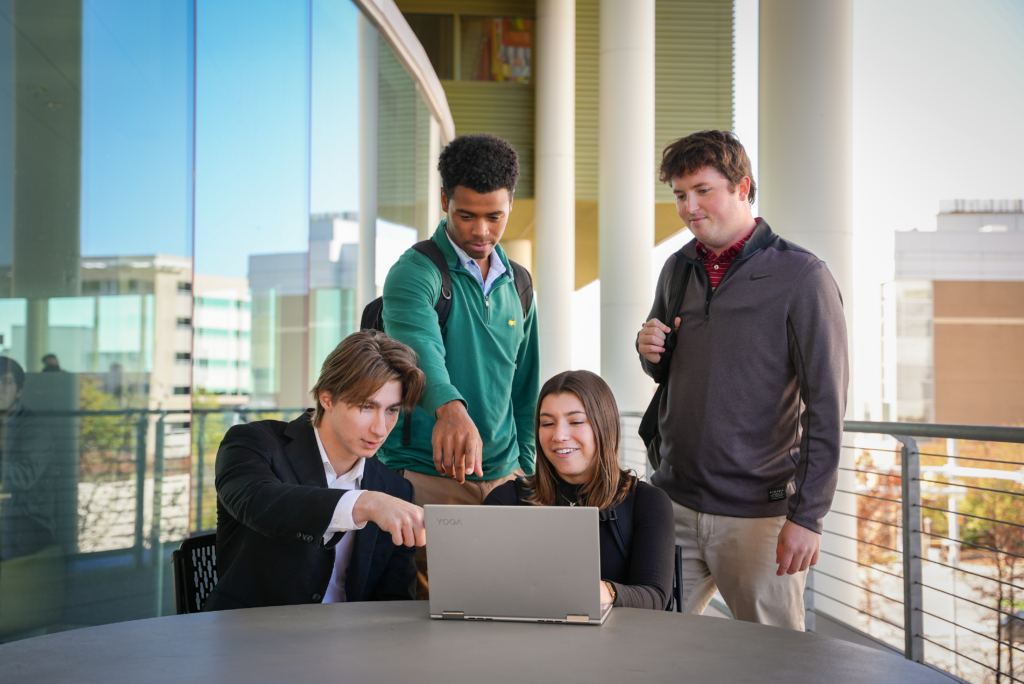
Undergraduate ambassadors at Darla Moore School of Business at the University of South Carolina. Courtesy photo
University of South Carolina Darla Moore School of Business
Ask Abhijit Guha, interim associate dean of undergraduate programs, and the secret sauce at Darla Moore School of Business is its hyper focus on student success.
Take Mackenzee Balzer who is headed to Ernst & Young after graduation. She secured quality internships not only in the summer after her junior year, but she also landed one with a Fortune 500 company after her sophomore year – the achievement for which she is most proud: “I didn’t have a ton of real-world experience leading up to this, but I was determined to start building my professional brand,” she wrote in a school communication. “I was able to apply the technological skills I learned in school and be very successful. I was one of only two rising juniors selected to take part in the program, (and) received recognition from the Vice President of Supply Chain who was very interested in my project.”
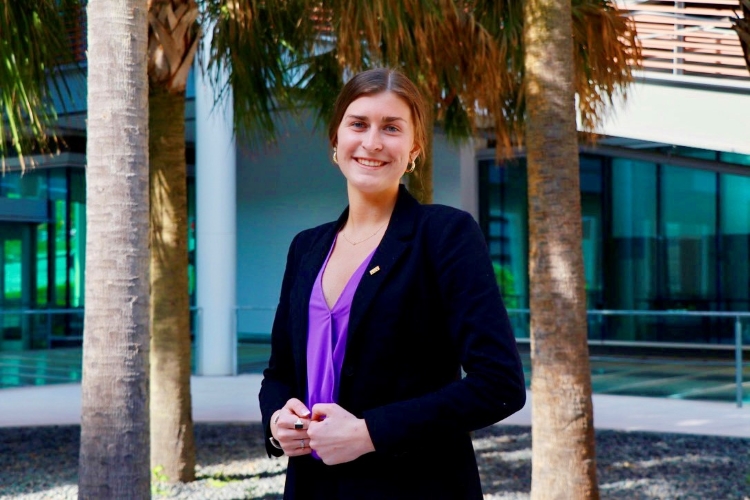
Mackenzee Balzer secured business internships in both her sophomore and junior years at Darla Moore, and she will work at Ernst & Young after graduation. Courtesy photo
Or Spencer Allen, a junior majoring in finance and international business, who secured a summer 2023 internship at Jefferies Group – one of Wall Street’s powerhouse bulge bracket investment banks. He did it despite the fact that he doesn’t live near the finance epicenters in New York City or San Francisco and though he doesn’t attend any of the top 25 feeder schools for investment banking.
Allen, a Carolina Finance Scholar, did it by leveraging Darla Moore’s alumni network and its emerging pipeline to Wall Street.
“I definitely think the Carolina Finance Scholars Program is punching above their weight. Although the University of South Carolina is not considered a target school, it has been able to break through this barrier and send numerous kids to elite investment banking, consulting, asset management, and wealth management firms,” Allen told P&Q in this 2022 article.
“I have seen students placed at firms such as Goldman Sachs, JPMorgan, Bank of America, Lazard, FT Partners, Jefferies, William Blair, Credit Suisse, Deutsche Bank, and many more, but I have only seen one or two firms directly recruit out of our university for these prestigious careers.”
This student-centric focus is showing results. The B-School saw an impressive 95.65% of the Class of 2022 securing full-time employment within three months of graduation, up from the strong 93.93% for the Class of 2022. Its major employers include Deloitte, Ernst & Young, Bank of America, Oracle, Boeing, and other top companies in a variety of sectors.
“What I hear over and over again from our employers is that our students are ‘business ready’ and ‘coachable,’” Guha tells Poets&Quants. “We emphasize both these points at Darla Moore School of Business.”
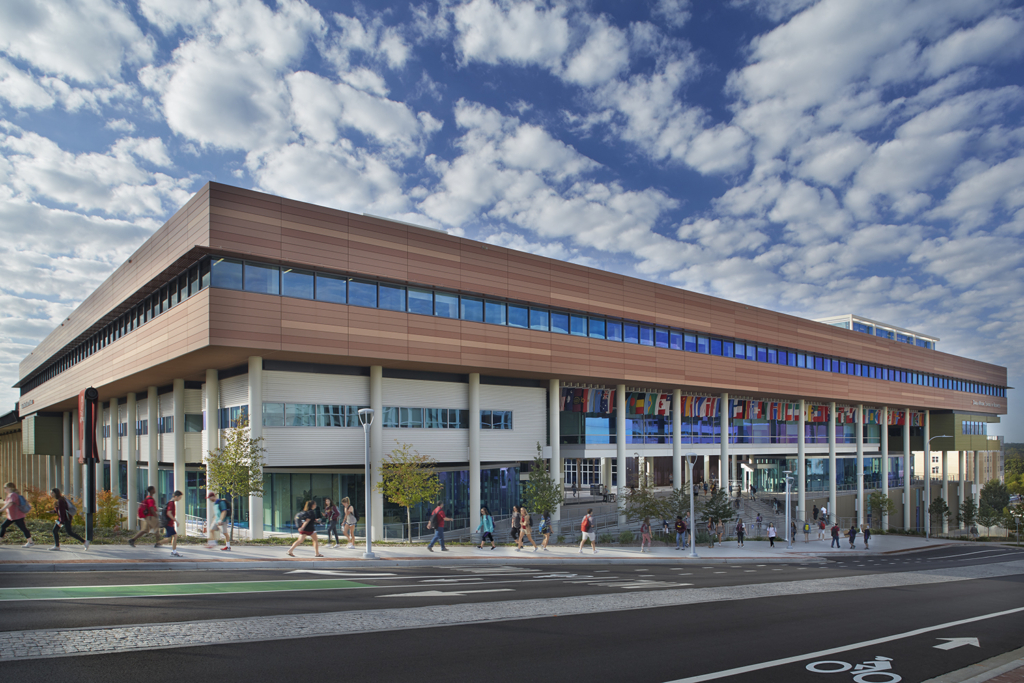
Darla Moore School of Business at University of South Carolina. Courtesy photo
P&Q INTERVIEW WITH ABHIJIT GUHA
Below, we interview Abhijit Guha, interim associate dean of undergraduate programs, about its strong focus on student success.
What are your program’s two biggest differentiators from other top undergraduate business programs? How do these prepare students for their careers?
First, we focus strongly on preparing our students for their career post Darla Moore School of Business (DMSB). We bring together:
- Faculty doing cutting edge research and faculty with applied experience, with strong ties to industry
- An excellent in-house career services team
- The potential to participate in experiential learning projects, as ways to best prepare our students for their careers beyond DMSB.
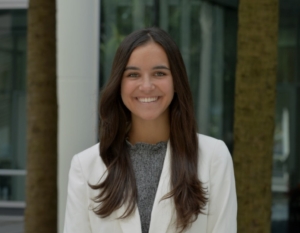
Katherine Hyde, a Darla Moore student, is going to work at JP Morgan after graduation.
For example, Katherine Hyde is going to work with J P Morgan after DMSB, and in one of our communications she mentioned that “I will never forget the moment I was contacted by someone from [a leading financial firm], and they had mentioned to me how, “Dr. Powers raved about your participation and curiosity in class.” Such connections between faculty and hiring firms greatly benefit our students. All of the above has led to steadily rising placement rates and salaries (e.g. our placement rate exceeds 95%).
Second, we focus on developing skillsets and mindsets that will keep students relevant in an ever changing world, not only the world right after DMSB, but also the world 5 to 10 years out. In this regard, I point to our strong focus on business analytics, our recent successes in placing students in technology-focused companies such as Oracle, and our urging students to always stay “coachable”.
For example, consider data analytics. The Data Lab recently conducted two data analytics competitions for students, sponsored by corporations (e.g. Boeing) and co-hosted with the College of Engineering and Computing. Students are intentionally solicited from multiple disciplines for such data analytics competitions, to increase cross-disciplinary and experiential learning.
What are recent and upcoming program developments and innovations that will enhance the experience of future students?
While the Moore School has had historical strengths (e.g. its top ranked International Business program, its linkage to University of South Carolina’s highly ranked first-year student experience), more recently DMSB has developed on two fronts: A strong focus on data analytics, and multiple opportunities for experiential learning.
In the latter case, beyond doing projects with firms, our students participate in case competitions, and our students take classes wherein they may be working directly with firms. All these prepare our students for their professional life post graduation.
Further, with Economics and Management now having scholars programs, most areas have programs that offer high-intensity experiential opportunities for Moore School undergraduates. Many scholars programs have direct input from employers; The Management Scholars program, for instance, has input from firms like UPS and International Paper. I note here that the stellar Finance Scholars program was featured by Poets and Quants in 2022 in the article “Under the radar: Inside Darla Moore’s pipeline to top Wall Street firms.”
Finally, the Moore School is launching a Sustainability concentration, noting here that sustainability is an important priority for many firms.
Explain the career services, programming, and extracurriculars that give your students an advantage in career outcomes?
Upfront, I give kudos to our excellent career services team, and their excellence is evidenced in our strong placement rates. But it goes beyond that.
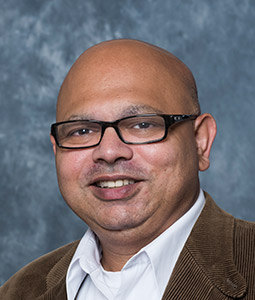
Abhijit Guha
First, many departments engage directly with firms, taking on real-life projects, and this often leads to these firms interviewing students who work on these projects. As one of my faculty colleagues in Operations and Supply Chain wrote in a testimonial about one of our students: “… has a rare and enviable combination of skills. He has distinguished himself as one of the most mathematically gifted and technically adept students in our program. Yet, he also has the business sense to identify important challenges, the writing skills to describe these problems, and the design chops to build managerial dashboards that allow data to help guide the way…. converted a class project with a global manufacturing firm into an internship and then into a full-time job. He will be starting in their leadership development and rotational program after graduation.”
We do want to build out, even more so than now, the linkage across class projects, internships and post DMSB job opportunities.
Second, many departments also develop courses that allow for the earning of industry-relevant certifications, and this gives students an advantage during the job search. For example, the Operations and Supply Chain major has certified almost 1,200 industry-validated Lean Six Sigma Green Belts (at the undergraduate level). And marketing majors with a declared sales emphasis may complete a dedicated four-course sales sequence taught by in-house marketing faculty, leading to the credential of Certified Professional Sales Person (CPSP), awarded by the National Association of Sales Professionals.
Finally, students benefit substantially from participation in case competitions/ other competitions, in terms of both professional development and preferential access to employers. For example, Moore School students have done very well in competitions like University of Pennsylvania’s “Consulting and Case Competition” and the University of South Florida’s “Selling with the Bulls”.
What separates your graduates from other business school graduates?
Based on my interactions with employers, our students are separated from others by way of their business readiness (on day one after DMSB) and their being “coachable.”
To make this point, I provide an example: Most students intern with firms in their junior year, and this helps them land a suitable (full time) job in their senior year. But there are some students who choose to go even further, to build their business readiness. Riley Nicosia and Mackenzee Balzer are two students who interned in both their sophomore year and their junior year, and this positioned them for success post DMSB.
When alumni look back on their time in your undergraduate business program, what would they consider to be their signature experience?
We focus strongly on student success, and so I think what alumni may remember is how DMSB put them in a position to succeed, and this often involves some DMSB members (faculty or staff or both) working with a student for long periods of time.
For example, faculty from the marketing area worked with a student some years ago on an analytics-related research project that lasted for well over a year, and this turned out to be the signature experience for the student. Here is what she wrote: “I actually ended up getting offered the job in Columbus with the Columbus Blue Jackets, an NHL team, where I will be doing marketing research and analytics for them. I did want to thank you for the experience I gained with our NACMA project because ultimately that was the main reason I got the position I did. I can’t thank you and Jeff enough for putting me in a position to get my dream job right out of college. Whatever you do, keep the undergrad research project! It gives students a chance to gain experience and put them ahead of other applicants for entry level and above positions. It was by far the most beneficial learning experience I could’ve ever asked for.”
This type of engagement, between students and faculty, occurs across many of our programs – whether through Honors Theses, case competitions, research opportunities, or team project work for local nonprofits and businesses. These experiences leave very positive, and very lasting, impressions on students.
What is the most underrated feature of your undergraduate business program and how does it enhance the experience for your business majors?
I think it is our focus on the student, and specifically on ensuring that the student is as business ready as possible, on day one right after DMSB. A number of faculty work towards taking students to case competitions, and providing opportunities for experiential learning, to make sure that students are truly business ready. For example, in 2021, Professor Sanjay Ahire was selected as the Michael J. Mungo Distinguished Professor of the year, for his commitment to teaching excellence and mentoring. Brielle Kolf, a 2017 graduate, says Ahire’s rigorous courses and tireless mentoring transformed her career trajectory. “During my first year at IBM I could immediately tell I was far more prepared professionally and academically than my peers… I can definitively say that Dr. Ahire’s influence in my education was truly pivotal. He transforms young business students into competitive job candidates [whom] companies seek out.”
What else would you like readers to know about your program?
First, for many students the pathway to success includes a specialized post-bachelor master’s program. Departments like Accounting, Management and International Business offer stellar post-bachelor master’s programs (MACC, MHR, MIB etc.), and work closely with those in the Moore School’s undergraduate program, such that students can begin earning a Master’s degree during their senior year, accelerating time-to-completion. For example, Sarah Doyle (now at Google) accelerated through the MIB program, finishing up within a semester of graduating from Moore School.
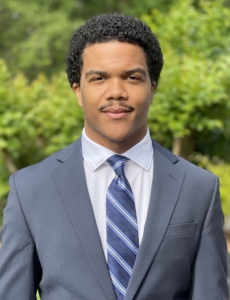
Brian Hayes
Second, the Moore School offers a wide variety of coursework, experiential activities and coaching that help students become business ready and move forward in their careers. But I would be remiss in not pointing out that many student-led organizations in DMSB also do stellar work in helping (other) students succeed.
One of our school’s stellar students is Brian Hayes; I have always been impressed by how he has managed a high-intensity job during his time here, and yet managed coursework and participation in experiential activities, like case competitions. But Brian noted that he benefitted very substantially from student-led organizations.
Specifically, he writes “I had the opportunity of pledging the Professional Business Fraternity of Delta Sigma Pi here at the University of South Carolina. Through the Pledging process I was pushed professionally, academically, and personally. I was able to learn skills through workshops that covered informational and behavioral interviewing, creating a resume and LinkedIn, and case presentations. The process built my confidence and put me in a good position to earn internships and post- grad opportunities.”
NEXT PAGE: New York University Stern School of Business











Questions about this article? Email us or leave a comment below.